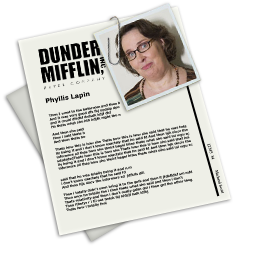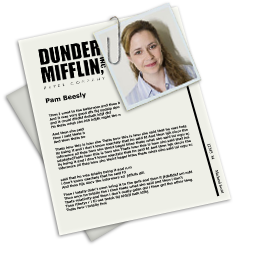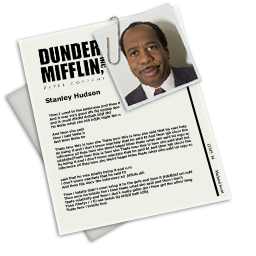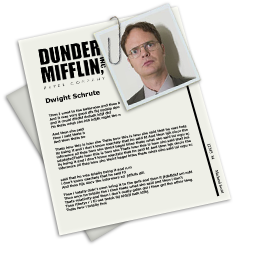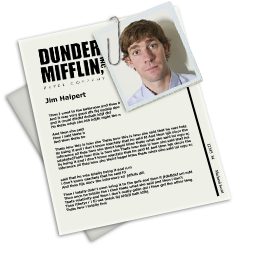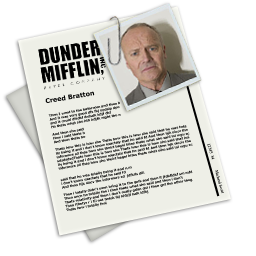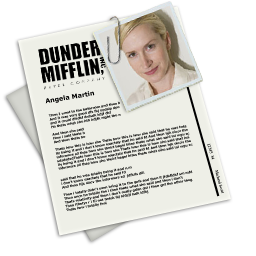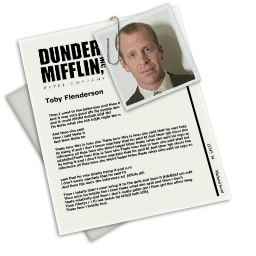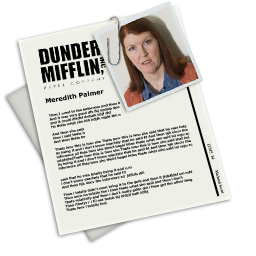The Economics of The Office
Learning economics from the world's best boss
The Incentive
When Andy becomes the new manager, he institutes a 'points system' to incentivize the office to sell more paper. His plan works better than expected when he offers to tattoo himself as the grand prize. This clip is a funny example of the power of incentives.
Season 8 Episode 2 "The Incentive"
Labor Productivity (J24) Microeconomic Behavior: Underlying Principles (D01) Compensation Packages (J33)
Yankee Swap
The office celebrates Christmas with a Secret Santa gift exchange. When Michael doesn't like the gift he receives, he turns the gift exchange into a gift swap where the employees can steal gifts from one another. This is great starting point to discuss the welfare effects of giving gifts and the heterogeneity of consumer preferences.
Season 6 Episode 13 "Secret Santa"
The Proposal
Jim pays for fireworks at Toby's farewell party so that he can propose to Pam. Doing so creates a positive externality for everyone at the party. Fireworks are a common example of a public good, because they are both non-rival and non-excludable. This makes it easy for individuals to free ride, utilizing the public good without contributing to its production. Jim learns this first hand when Andy makes the most of the romantic atmosphere.
Season 4 Episode 19 "Goodbye, Toby"
Externalities (D62) Microeconomic Behavior: Underlying Principles (D01)
The Surplus
It's the last day of the fiscal year at Dunder Mifflin and Michael must spend the last $4300 in his budget or lose it for all subsequent years. This clip illustrates the unintended consequences of perverse incentives.
Season 5 Episode 10 "The Surplus"
The Surplus: Part Two - Rent Seeking Behavior
Oscar and Jim team up with a few other employees to lobby for a new copier. Pam, Stanley and Meredith form a group to lobby for new chairs. Michael is the World’s Best Boss, and also the one who ultimately decides if the $4300 will be spent on new chairs or a new copier. Oscar and Jim waste valuable resources, time that they could spend working, to take Michael out for lunch to convince him they need a new copier. When they get back from lunch, Pam diverts time away from her job and toward chair-seeking efforts. Others go out of their way to open doors for Michael and bring him hot chocolate. All the employees allocate resources in an attempt to “win” the rent. These rent-seeking efforts and expenditures result in negative social value. Thanks to Lizzie Banks, an econ major at the University of Virginia, for suggesting this clip.
Season 5 Episode 10 "The Surplus"
Halloween
This is a great example of how efficiency wages help minimize employee turnover. Dwight is willing to work for whoever “most values his loyalty!”
Season 2 Episode 4 "Halloween"
Image is Everything
This clip illustrates conspicuous consumption and the idea that someone may consume something to impress others as opposed to actually getting utility from the good itself.
Business School
Another example of why not to invest in multilevel marketing. Michael explains he “lost all of his money in a pyramid scheme” when he was an undergraduate. After that clip there are several discussions about business which I think are worth keeping and faculty can evaluate as they see fit.
Cyclical vs. Structural Unemployment
Michael quit his job (frictional unemployment) but finds out that the economy is in a severe downturn (cyclical unemployment). This demonstrates the idea that most workers are more willing to engage in a job search when cyclical unemployment is high ceteris paribus.
Season 5 Episode 14 "Two Weeks"
Buyout
Michael realizes that he is in a better bargaining position than he might have earlier realized. Even though his strategy is irrational because he should be desperate to sell, he takes a game theory optimal approach because David Wallace’s utility function does not match that of Dunder Mifflin as a company. We could also label this clip as a demonstration of the “Principal Agent Problem” because David is the principal acting on behalf of all Dunder Mifflin Shareholders.
Microeconomic Behavior: Underlying Principles (D01) Production and Cost (D24)
